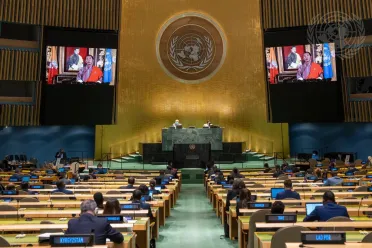Statement
Statement summary
LOTAY TSHERING, Prime Minister of Bhutan, noted that, when the COVID-19 crisis unfolded, his country sailed through “with a minimum scratch from the pandemic”. His country had only 3 COVID deaths and slightly over 2,500 cases so far, most of which were imported cases. The vaccination coverage for 12 years of age and older was now almost 80 per cent. Despite having constrained resources, Bhutan did not compromise on the quality and standards of the COVID measures, adding that the Government delivered uninterrupted routine health services. Besides the regular vaccination programmes, Bhutan introduced HPV vaccines for the first time for boys and flu shots for everyone.
“Just like the rest of the world, we are looking at the pandemic as an opportunity to reset ourselves,” he continued, highlighting that the process to overhaul Bhutan’s civil service in line with education reform was under way. Knowing that the path ahead is information and communications technology-driven, the country has started digital initiatives with the goal for everyone in Bhutan to have a digital ID as a build-up for a big data system. The Central Bank was also piloting a project on digital Ngultrum, Bhutan’s currency, using blockchain technology. He also described the “De-Suung” programme which engaged Bhutanese citizens in a greater role of nation building. In addition, volunteers were helping guard the borders and entry points, ensuring everyone followed COVID-19 norms.
The International Labour Organization (ILO) projects a global shortfall of 75 million jobs this year and 23 million in 2022, he pointed out, calling the ongoing national youth engagement programmes a major step in recovering from the pandemic. Stressing that nobody knows where SARS-CoV-3 is incubating, he stressed: “We must be prepared with a more resilient system for the future.” Thus, quality health care must be easily accessible and affordable by everyone.
As well, the pandemic disrupted the already‑weak global food system, he noted. Over 90 million people in the Asia-Pacific region alone were pushed back into extreme poverty in the pandemic’s aftermath. Therefore, the international community must coordinate clear action plans to meet the immediate food shortage. In that regard, climate change always tested the resilience of cultivated food, as well as the patience of the growers. “We must talk about tough climate laws as a component of nationally determined contributions from all countries,” he stated.
The COVID-19 pandemic will leave behind a different world, he said. The Secretary-General’s Our Common Agenda offered a good reference point for collective progress. He expressed his country’s commitment to work with other Member States in advancing the ideas of the report. Highlighting that the theme of the seventy-sixth General Assembly session was designed for Bhutan, he highlighted how the pandemic brought out the very essence of his country’s gross national happiness, which seeks collective happiness and not just of oneself. “It calls for us to act in unity,” he said.
Full statement
Read the full statement, in PDF format.
Photo

Previous sessions
Access the statements from previous sessions.
